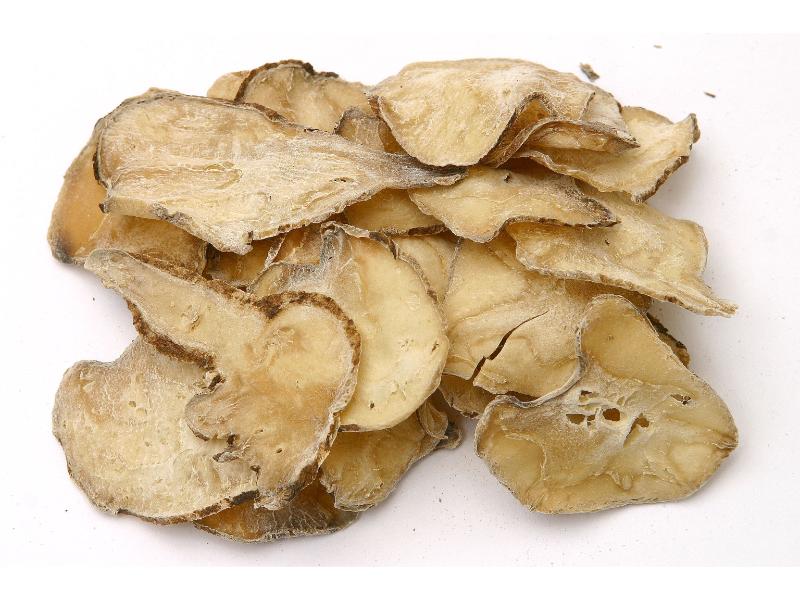Search in medicinals
Aconiti Radix Lateralis Praeparata
Aconite [accessory root]
附子 〔附子〕 fù zǐ

Alternate Chinese names: 制附子 zhì fù zǐ; 熟附子 shú fù zǐ 熟附 shú fù; 附片 fù zǐ
Kingdom: Plant
Origin in PRC Pharmacopoeia: Aconitum carmichaeli Debx. (PRC Pharmacopoeia)
Origin in unofficial sources: Aconitum carmichaeli Debx.
Use: Medicinal and alimentary
Category: Interior-warming agents
Properties: Acrid and sweet; hot; toxic.
Channel entry: Heart, spleen, and kidney channels.
Actions and indications:
- Returns yáng and stems counterflow: Yáng collapse.
- Supplements fire and assists yáng: Yáng vacuity.
- Warms the channels, disperses cold, eliminates dampness, and relieves pain: Cold impediment.
- Disperses cold and frees the network vessels: Yīn flat-abscesses.
- Strengthens supplementing actions: When using Rén shēn (人参 Ginseng Radix, ginseng) and Huáng qí (黄芪 Astragali Radix, astragalus [root]) a small quantity of fù zǐ is sometimes added to strengthen the supplementing action of these medicinals.
Dosage and method: Oral: 3–15g. fù zǐ and its related medicinals chuān wū and cǎo wū (see Associated Medicinals below) should be predecocted for 30–60 minutes to reduce their toxicity.
Warnings: Contraindicated in pregnancy, in yīn vacuity with exuberant yáng, and in white fù zǐ,
is a distinct substance unrelated to this agent.
Product description: The dried accessory tuber is roughly spindle-shaped, about 1.5–3 cm long and 1.5 cm in diameter. It has shoot scars at the top and a pointed tip at the bottom and is covered with numerous timorous protuberances. It comes in several forms. Hēi shùn piàn (黑顺片 Aconiti Radix Lateralis Denigrata, black sliced aconite [accessory root]): Skinned, cut 2–5 mm longitudinal slices, black on the outside and blackish yellow on the cut edge. Bái fù piàn (白附片 Aconiti Radix Lateralis Alba, white sliced aconite [accessory root]): Skinned, cut in 5 mm transverse slices. Pào fù zǐ (炮附子 Aconiti Radix Lateralis Tosta, blast-fried aconite [accessory root]): Skinned, cut in 3–4 mm thick slices, yellow and slightly translucent. Taiwanese stone-baked aconite (tái wān bēi fù zǐ 台湾焙附子): 1 mm thick longitudinal slices, farinaceous in texture.
Quality: Fat hard tubers are the best.
Production area: Sìchuān and Shǎnxī (Shaanxi).
Etymology: The Chinese name fù zǐ 附子 means appendage,
reflecting the fact that this is accessory tuber, rather than the main tuber.